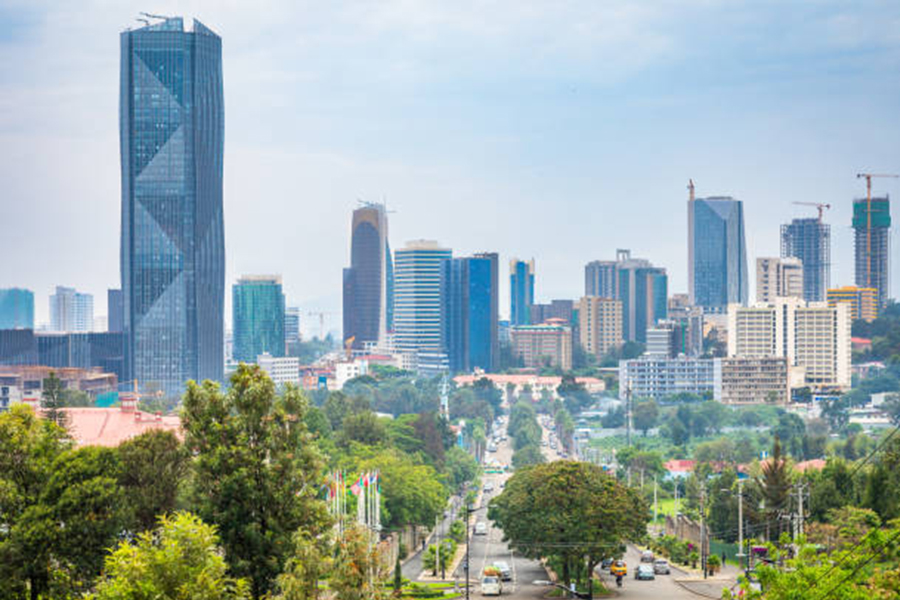
Radar | Sep 29,2024
Aug 13 , 2022
By Christian Tesfaye
No matter one’s predilections against cryptocurrency, it is hard not to appreciate their innovativeness and chutzpah. Of course, the hold of fiat currencies was meant to be challenged at some point. The world went from a barter system and trading in grains to silver and gold coins. Cash, underwritten by the state's power, could not be the mainstay forever.
Cryptocurrencies introduce a few novelties to the table. First, it is digital (although not all digital currencies are cryptocurrencies), a collection of 0s and 1s stored in distributed ledgers such as blockchain, which holds Bitcoin. Instead of relying on security agencies, complex engraving and threat of legal actions to protect against counterfeiting, cryptocurrencies use cryptology (from which the name comes) to make copying nearly impossible.
All of this is good, but if the currency is virtual, might not new ones be produced (minted) endlessly, thus making it useless?
Satoshi Nakamoto, the anonymous creator of Bitcoin, had an answer. He ensured that the new “mining” of Bitcoin blocks gets harder with each fresh mint of the virtual currency. It is like a game where every new level gets harder and harder until very few people with lots of time and resources on their hands can do it. Nakamoto also capped the number of Bitcoins that can be mined at 21 million. Since the rewards (in new Bitcoin) with each new mining are cut in half every few years, estimates are that the last new Bitcoin minted will be in 2140. It is a neat trick.
Nonetheless, nothing is as fascinating and dangerous to the relevance of fiat currency as cryptocurrencies’ case for decentralisation. Institutions, laws and governments all work closely to offer a third-party guarantee that all transactions are enforced and legitimate. Funds can be transferred from one party to another, peer-to-peer, at much cheaper rates and validated and secured through proof of work (another crucial concept in the blockchain) and cryptographic codes. Cryptocurrency promises the middle persons that have accumulated immense power over the years (banks) and their enforcer buddies (central banks) are unnecessary.
The likes of Bitcoin are, indeed, flawed. Cryptocurrencies are volatile and arguments that they could be used as hedges against inflation or economic turmoil have been proven inaccurate. Year-to-date, it is down over 51pc. Like most currencies, it is worth much less than a year ago. And much like most equity holdings, it has gone down in value as economic growth slowed.
Cryptocurrencies are also concentrated in the hands of the few, which flies in the face of the claim to be the currency of choice for the average person. Bitcoin will not deliver us from elitism and powerful institutions such as banks. It will merely deliver us to a new brand of elites and institutions such as Coinbase, the largest cryptocurrency trading platform.
Decentralised currencies are obviously not ready to replace fiat currency. Hold on to the dollar, or the Birr. But this does not take away from the awesome challenge they have posed against how we think about the economy and finance.
Do we need centralised systems of finance? Are the middle persons necessary? Who gave the state the right to be a monopoly issuer of currency? What is the underlying justification for such accumulation of power? And if the state’s role as a third-party guarantor and minter of a nation’s currency could be fairly and successfully emulated, does it not have the duty to surrender such power?
These questions are not ready to be answered now. Least of all, cryptocurrencies should rise to the challenge and prove themselves legitimate in the eyes of the average person. It does not mean, though, that they are not endlessly fascinating innovations, a work of imagination and curiosity that have gotten us to question our political and economic systems.
PUBLISHED ON
Aug 13,2022 [ VOL
23 , NO
1163]


Radar | Sep 29,2024

Viewpoints | Jun 28,2025

Radar | Jun 30,2024

Fortune News | May 17,2025

In-Picture | May 18,2024

Radar | Oct 27,2024

Featured | Sep 08,2024

Editorial | Nov 04,2023

Fortune News | Sep 22,2024

Fortune News | May 23,2025

My Opinion | 131974 Views | Aug 14,2021

My Opinion | 128363 Views | Aug 21,2021

My Opinion | 126301 Views | Sep 10,2021

My Opinion | 123917 Views | Aug 07,2021

Dec 22 , 2024 . By TIZITA SHEWAFERAW
Charged with transforming colossal state-owned enterprises into modern and competitiv...

Aug 18 , 2024 . By AKSAH ITALO
Although predictable Yonas Zerihun's job in the ride-hailing service is not immune to...

Jul 28 , 2024 . By TIZITA SHEWAFERAW
Unhabitual, perhaps too many, Samuel Gebreyohannes, 38, used to occasionally enjoy a couple of beers at breakfast. However, he recently swit...

Jul 13 , 2024 . By AKSAH ITALO
Investors who rely on tractors, trucks, and field vehicles for commuting, transporting commodities, and f...

Jul 5 , 2025
Six years ago, Ethiopia was the darling of international liberal commentators. A year...

Jun 28 , 2025
Meseret Damtie, the assertive auditor general, has never been shy about naming names...

Jun 21 , 2025
A well-worn adage says, “Budget is not destiny, but it is direction.” Examining t...

Jun 14 , 2025
Yet again, the Horn of Africa is bracing for trouble. A region already frayed by wars...

Jul 6 , 2025 . By BEZAWIT HULUAGER
The federal legislature gave Prime Minister Abiy Ahmed (PhD) what he wanted: a 1.9 tr...

Jul 6 , 2025 . By YITBAREK GETACHEW
In a city rising skyward at breakneck speed, a reckoning has arrived. Authorities in...

Jul 6 , 2025 . By NAHOM AYELE
A landmark directive from the Ministry of Finance signals a paradigm shift in the cou...

Jul 6 , 2025 . By NAHOM AYELE
Awash Bank has announced plans to establish a dedicated investment banking subsidiary...